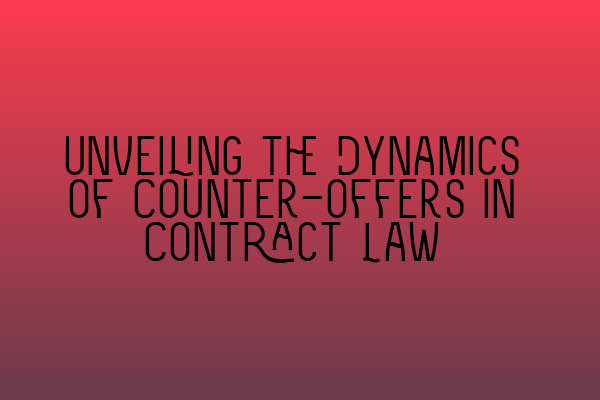Unveiling the Dynamics of Counter-offers in Contract Law
In the world of contract law, negotiation is a key component of reaching agreements between parties. During the negotiation process, one party may make an initial offer, which is then met with a counter-offer from the other party. This back-and-forth exchange helps to establish the terms and conditions of the final contract. Understanding the dynamics of counter-offers is essential for solicitors and legal professionals involved in contract law.
A counter-offer occurs when the offeree rejects the initial offer and proposes new terms and conditions. This proposal essentially terminates the original offer and introduces a new one, shifting the power dynamics between the parties. While counter-offers are a common occurrence in contract negotiations, they carry important legal implications that must be carefully considered.
Key Legal Considerations in Counter-offers
1. Termination of the Original Offer
When a counter-offer is made, the original offer is effectively terminated. This means that the original offeror is no longer bound by the terms and conditions of their initial offer. Instead, they have the option to accept, reject, or propose a counter-offer in response. This termination of the original offer is vital to understand, as it sets the stage for further negotiations.
2. Mirror Image Rule
The mirror image rule is a principle in contract law that states that the acceptance of an offer must mirror the terms of the original offer exactly. In other words, the acceptance must be a “mirror image” of the initial offer, without any modifications or additional conditions. If the acceptance includes new terms or conditions, it is considered a counter-offer, and the original offeror has the right to accept or reject it.
3. Intention to Create Legal Relations
In order for a counter-offer to be legally enforceable, it must demonstrate the intention of the parties to create legal relations. This means that both parties must intend for the counter-offer to create a legally binding agreement. If there is no intention to create legal relations, the counter-offer may be deemed invalid and unenforceable. Solicitors must carefully assess the intention of the parties when reviewing counter-offers.
4. Communication and Timing
Communication is crucial in the context of counter-offers. The counter-offer must be communicated in a timely manner and received by the original offeror before they have accepted the initial offer. If the counter-offer is not communicated or is received after the acceptance of the original offer, it may not be valid. Solicitors should advise their clients on the importance of timely communication during the negotiation process.
Effects of Counter-offers
Counter-offers can have several effects on the negotiation process and the final contract. Some key effects to consider include:
1. Rejection of the Original Offer
By making a counter-offer, the offeree rejects the initial offer. This rejection may lead to further negotiations or it may terminate the negotiation process altogether. It is important for solicitors to communicate the consequences of making a counter-offer to their clients.
2. Shifting of Power Dynamics
Counter-offers can shift the power dynamics between the parties. The original offeror becomes the offeree and now has the option to either accept the counter-offer, propose a further counter-offer, or reject the counter-offer. This shifting of power can significantly impact the negotiation process.
3. Formation of a New Contract
If the counter-offer is accepted without further modifications, it becomes the basis for the formation of a new contract. The terms and conditions of the original offer are no longer applicable. Solicitors must ensure that their clients fully understand and agree to the terms of the counter-offer before acceptance.
Conclusion
Counter-offers are an integral part of contract negotiations in contract law. They play a significant role in shaping the final terms and conditions of a contract. Understanding the legal implications and dynamics of counter-offers is crucial for solicitors involved in contract law. By closely examining the termination of the original offer, the mirror image rule, the intention to create legal relations, and the importance of timely communication, solicitors can effectively navigate the complexities of counter-offers and guide their clients towards successful contract negotiations.
Related Articles:
– Securing Training Contracts: A Roadmap to Becoming a Solicitor
– Mentorship for Aspiring Solicitors: Nurturing Talent in the Legal Field
– Legal Challenges and Pitfalls: Navigating the Complexities of the Legal System
– The GDL (Graduate Diploma in Law): A Pathway to Becoming a Solicitor
– Mastering the Solicitor’s Path: Prepare for the Journey Ahead
